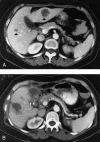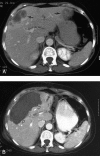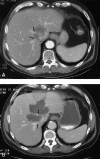Radiofrequency ablation of unresectable primary and metastatic hepatic malignancies: results in 123 patients
- PMID: 10400029
- PMCID: PMC1420837
- DOI: 10.1097/00000658-199907000-00001
Radiofrequency ablation of unresectable primary and metastatic hepatic malignancies: results in 123 patients
Abstract
Objective: To describe the safety and efficacy of radiofrequency ablation (RFA) to treat unresectable malignant hepatic tumors in 123 patients.
Background: The majority of patients with primary or metastatic malignancies confined to the liver are not candidates for resection because of tumor size, location, or multifocality or inadequate functional hepatic reserve. Local application of heat is tumoricidal; therefore, the authors investigated a novel RFA system to treat patients with unresectable hepatic cancer.
Patients and methods: Patients with hepatic malignancies were entered into a prospective, nonrandomized trial. The liver tumors were treated percutaneously or during surgery under ultrasound guidance using a novel LeVeen monopolar array needle electrode and an RF 2000 generator. All patients were followed to assess complications, treatment response, and recurrence of malignant disease.
Results: RFA was used to treat 169 tumors (median diameter 3.4 cm, range 0.5 to 12 cm) in 123 patients. Primary liver cancer was treated in 48 patients (39.1%), and metastatic liver tumors were treated in 75 patients (60.9%). Percutaneous and intraoperative RFA was performed in 31 patients (35.2%) and 92 patients (74.8%), respectively. There were no treatment-related deaths, and the complication rate after RFA was 2.4%. All treated tumors were completely necrotic on imaging studies after completion of RFA treatments. With a median follow-up of 15 months, tumor has recurred in 3 of 169 treated lesions (1.8%), but metastatic disease has developed at other sites in 34 patients (27.6%).
Conclusions: RFA is a safe, well-tolerated, and effective treatment to achieve tumor destruction in patients with unresectable hepatic malignancies. Because patients are at risk for the development of new metastatic disease after RFA, multimodality treatment approaches that include RFA should be investigated.
Figures





Comment in
-
Radiofrequency ablation of hepatic malignancies: is heat better than cold?Ann Surg. 1999 Jul;230(1):9-11. doi: 10.1097/00000658-199907000-00002. Ann Surg. 1999. PMID: 10400030 Free PMC article. No abstract available.
References
-
- Beasley R. Hepatitis B virus: the major etiology of hepatocellular carcinoma. Cancer 1988; 61: 1942–1956. - PubMed
-
- Di Bisceglie A. Hepatocellular carcinoma: molecular biology of its growth and relationship to hepatitis B virus infection. Med Clin North Am 1989; 73: 985–995. - PubMed
-
- Arya S, Ashraf S, Parande C, et al. Hepatitis B and delta markers in primary hepatocellular carcinoma patients in the Gizan area of Saudi Arabia. APMIS Suppl 1988; 3: 30–34. - PubMed
-
- Bridbord K. Pathogenesis and prevention of hepatocellular carcinoma. Cancer Detect Prev 1989; 14: 191–192. - PubMed
-
- Di Bisceglie A, Rustgi V, Hoofnagle J, et al. NIH conference on hepatocellular carcinoma. Ann Intern Med 1988; 108: 390–401. - PubMed
Publication types
MeSH terms
LinkOut - more resources
Full Text Sources
Other Literature Sources
Medical

